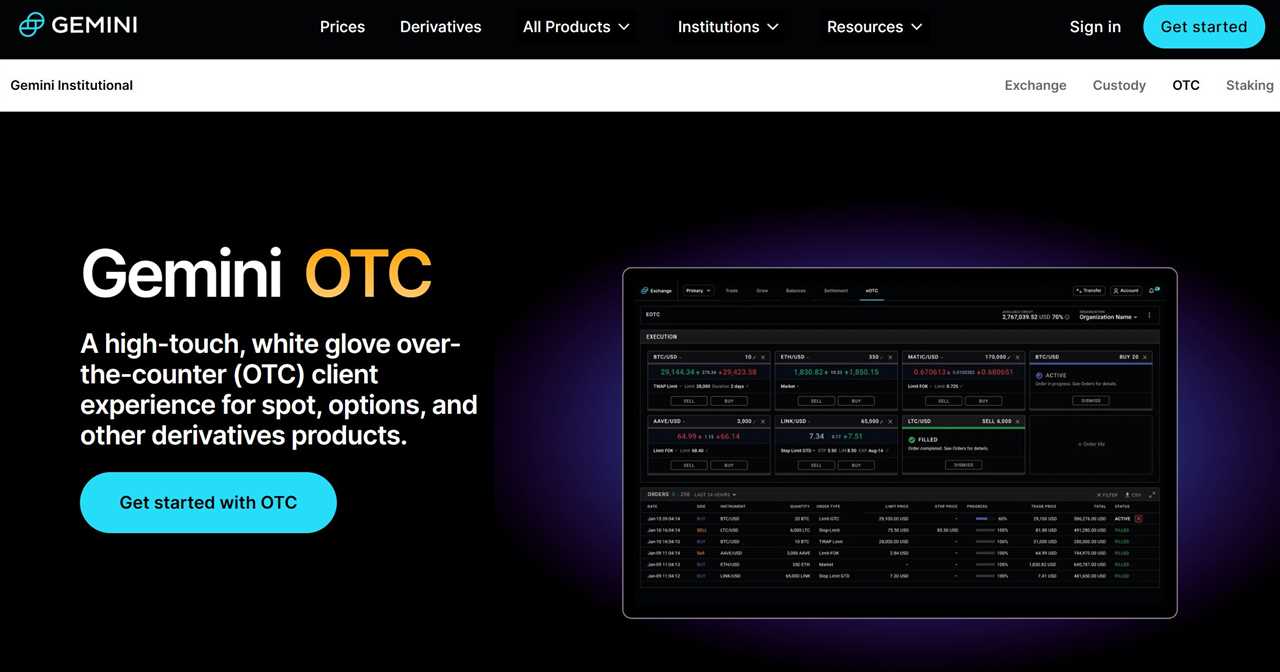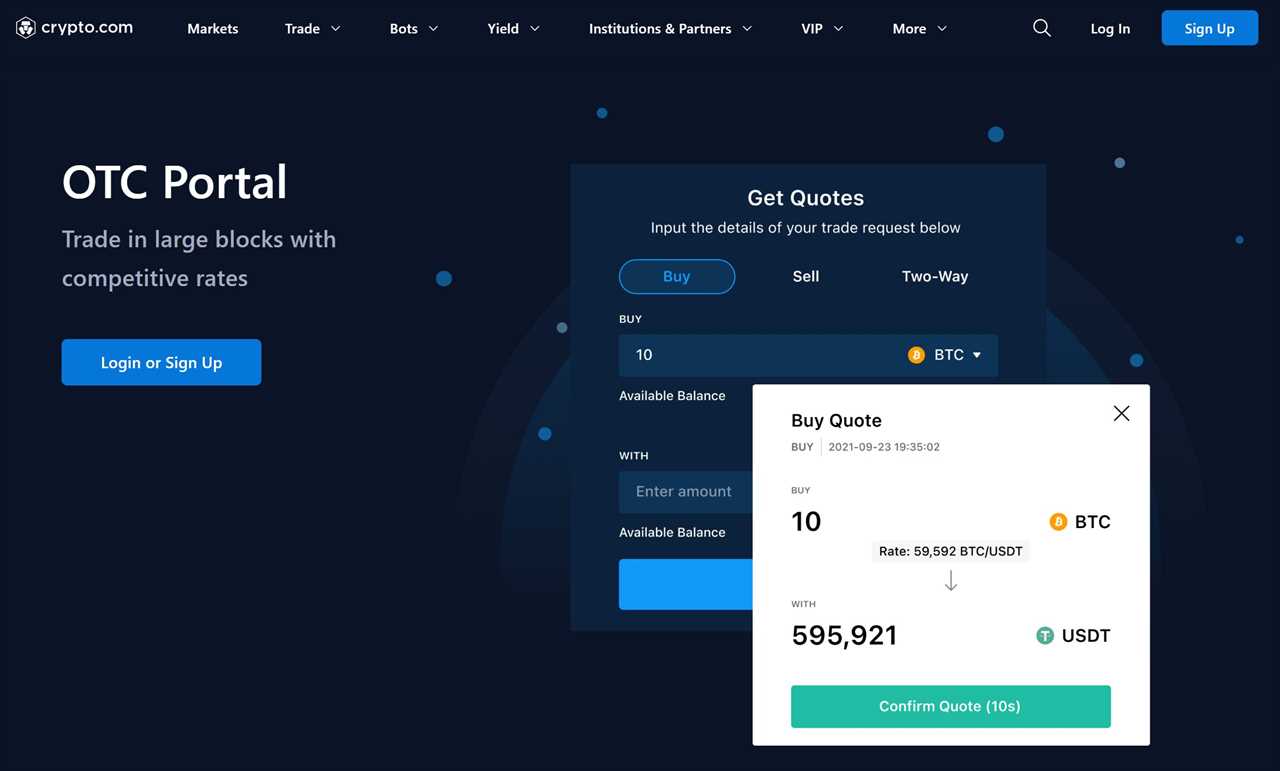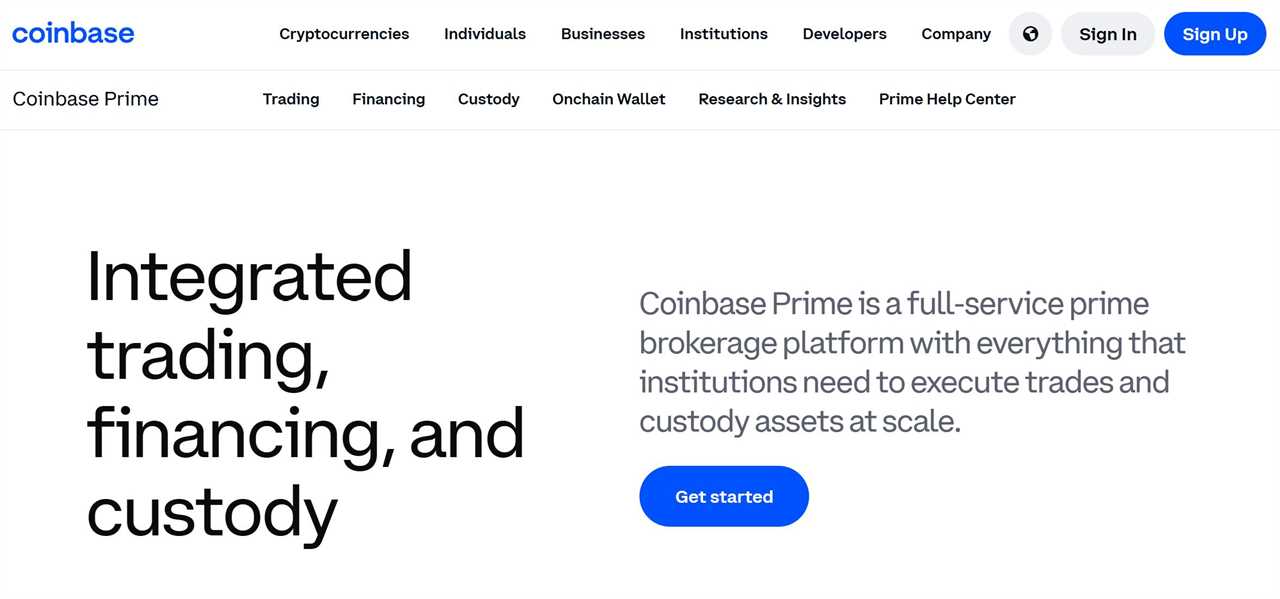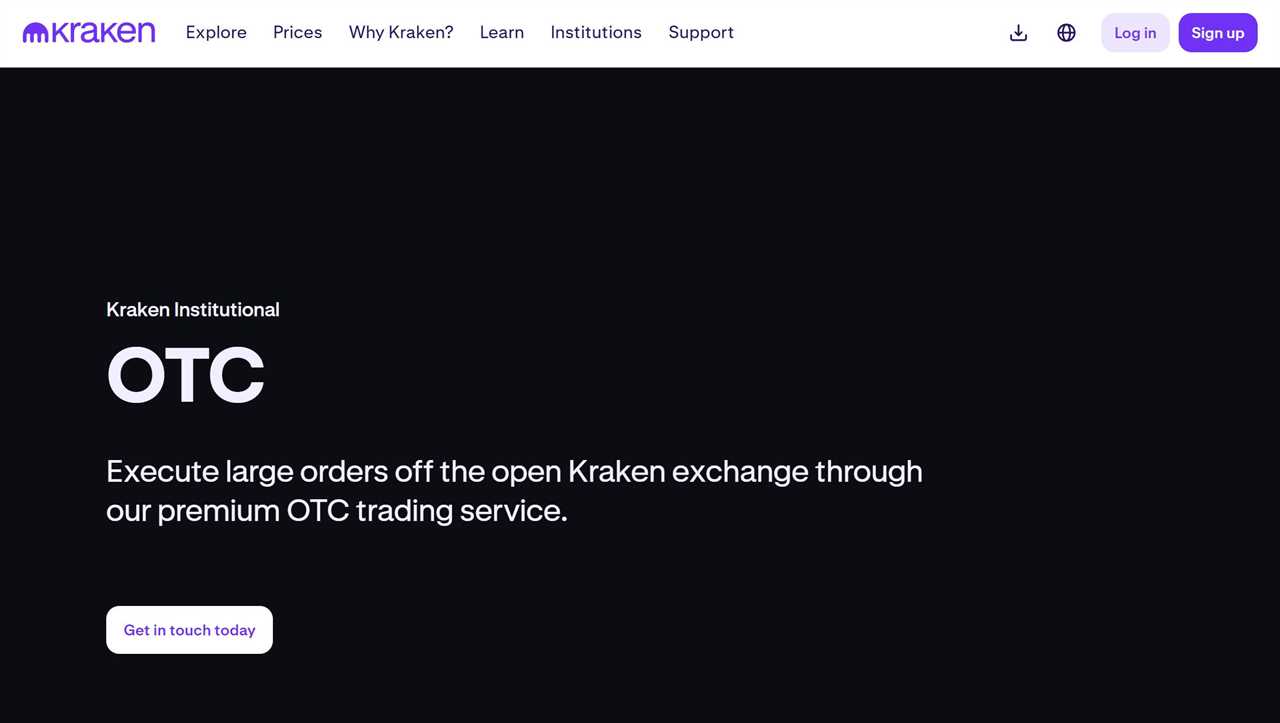When most people think of crypto trading, public exchanges come to mind. But how do large holders or institutions trade big volumes without impacting market prices? That’s where OTC (over-the-counter) crypto trading comes in — a private, off-exchange method for executing large trades discreetly, outside of traditional exchanges, much like buying a house directly from the owner.
While retail traders use regular CEXs and DEXs, high-net-worth individuals and institutions often prefer the privacy and flexibility of OTC crypto platforms. This guide explains how OTC trading works and helps you decide if it’s the right fit for you.
What Is OTC Trading in Crypto?
Picture this scenario: you’re a serious crypto trader who has just placed a mega order on a cryptocurrency exchange. And then, out of nowhere, it’s like someone just shared the news with the entire crypto market. Suddenly, there’s a severe market reaction as prices start getting adjusted, trading bots front-run your trade. Then you see your order slowly slipping through the cracks. That’s because the traditional cryptocurrency exchange wasn’t designed for big traders like you.
In the context of cryptocurrency trading, over-the-counter (OTC) crypto trading refers to a unique process of buying and selling crypto. OTC facilitates the direct buying and selling of digital assets between buyers and sellers outside of traditional cryptocurrency exchanges. The process involves private transactions between the two parties catering to high-volume transactions. These traders prefer privacy and want to avoid market disruption due to the size of their orders.
OTC deals in crypto are facilitated by a crypto OTC platform acting as an intermediary between buyers and sellers. They execute significant transactions on the public order book quietly and efficiently without sending any shockwaves across the market. By keeping large transactions discreet, the trade process minimizes potential price slippage. They also ensure that such transactions occur efficiently without attracting unfavorable public attention.
How Does Crypto OTC Trading Work?
In the traditional over-the-counter (OTC) market, the trader plays the role of market maker. They skillfully set prices for buying and selling associated financial instruments, ranging from currencies to securities. But when it comes to OTC deals crypto, the OTC trading platform functions as a matchmaker between the buyer and the seller. The OTC acts as the intermediary that connects the two parties. They cater for individual needs, the quantity of crypto, and the price of the cryptocurrency in question.
The counterparties are responsible for discussing the terms of the trade. These include factors like prices, mode of settlement, and duration, before they execute the deal. Once the parties have agreed to the terms of the agreement, the broker assumes the role of a referee. They ensure that a safe and secure transaction and settlement process takes place. The process typically involves several techniques, including in-person meetings for large transfers, escrow services, and reverse transfers as needed.
The OTC Trading Process
The process of OTC Bitcoin trading begins with counterparties agreeing on a price and terms directly or through a broker. This arrangement benefits both parties, as it helps eliminate the possibility of the large trade creating an unintended market impact. That’s because the details don’t reach the larger cryptocurrency community.
- Initiate Contact: A trader contacts an OTC desk or an over-the-counter exchange to explain their trade intentions and inquires whether there are available parties.
- Discuss Terms: The OTC expert engages both traders in a dialogue and guides them to agree on the details of the trade, including prices, volumes, and settlement methods, in an environment where both parties communicate their expectations to avoid any future misunderstandings.
- Verify Identities: The OTC desk confirms and verifies the identities of both parties and, where possible, employs established practices such as Know Your Customer (KYC) verification to ensure that all documentation is duly completed and verified promptly.
- Negotiate Details: The OTC desk facilitates negotiations between the seller and buyer to finalize the finer details of the deal, including any adjustments, and ensures that both parties are in agreement and accept all the conditions.
- Execute the Trade: The OTC trading platform facilitates the transaction and coordinates the process of exchanging payments and digital assets according to the agreed-upon terms and conditions.
- Settle the Transaction: The counterparties execute the trade by completing digital payments or bank transfers as agreed upon.
- Confirm Completion: The crypto OTC platform confirms that both parties have received what they bargained for and provides them with final documentation to prove the trade was settled successfully.
Types of OTC Trading
There are various types of OTC cryptocurrency trading, each presenting distinct approaches and offering different benefits. However, the most common ones that you may want to consider are:
Broker-Facilitated OTC Trading
In this scenario, the broker acts as an intermediary in the OTC trading process. They connect the buyer and seller, enabling them to execute a high-value crypto trade efficiently and privately. The broker utilizes their networks to secure the best prices for both parties and facilitate quick settlements. Several broker OTC platforms offer customized OTC cryptocurrency services, along with insights into the practice, to help users make informed choices and decisions. Among the most popular broker-affiliated OTC crypto trading platforms include Coinbase Prime, Kraken OTC, Binance OTC, and Bitstamp, to name a few.
Peer-to-Peer (P2P) OTC Trading
The P2P OTC crypto trading model enables crypto traders to transact directly with each other, eliminating the need for an intermediary. They mostly employ escrow services to address security concerns that often accompany such situations. Peer-to-peer over-the-counter crypto trading primarily attracts traders who enjoy discreet trading and appreciate exploring flexible payment methods and trading terms. Some of the cryptocurrency exchanges that facilitate P2P OTC trading include OKX, Paxful, Binance P2P, and KuCoin.
Crypto OTC Trading Desk
Crypto OTC trading desks utilize their network of sellers and buyers to facilitate the execution of large digital asset transactions. Once a buyer or seller approaches the OTC desk, the desk generally quotes a price. If the client is agreeable, the desk will match them with a willing counterparty and assist in executing the trade until the final settlement is completed. As a result, high-volume crypto traders, such as high-net-worth individuals, enjoy a seamless and efficient process that bypasses the traditional order book.
One of the primary reasons traders love OTC desks is that they offer numerous benefits that traders wouldn’t find in a traditional cryptocurrency exchange. Moreover, an OTC desk can customize its service to enhance a trader’s trading experience, addressing their specific trade strategies and requirements. Others will still offer professional insights and support required to undertake complex investment decisions.
Principal vs. Agency Desk in Crypto OTC Trading
When it comes to the practice of OTC Bitcoin trading, you can choose between trading with a Principal OTC crypto trading desk and using an Agency OTC crypto desk. So what are the differences?
1. Principal OTC Crypto Trading
In the Principal OTC crypto trading model, the OTC desk will buy or sell cryptocurrency on behalf of the client using its funds. The desk, therefore, assumes the market risk to fulfill the customer’s request, including when the price may fluctuate during the trade process. Once a client places an order, say for 1,000 BTC, the desk will use its funds to buy the Bitcoin and deliver them at the pre-agreed price, regardless of what happens to the asset’s price during the contract period.
2. Agency OTC Crypto Trading
On the agency version, the OTC desk will primarily act as an intermediary and wait for the customer to pay for the cryptocurrency they have ordered. The desk will match the buyer’s order with the seller’s, therefore letting the customer bear any associated risks. If, perchance, the prices become unfavorable before the buyer finalizes the transaction, it will be their business to adjust the offer accordingly. In the case of the Agency model, the desk charges a facilitation fee, unlike in the Principal model.
OTC Trading vs. Regular Exchange Trading
| Feature | OTC Platform | Regular Exchange |
| Definition | A platform where crypto is traded directly between two parties, without an exchange | A centralized platform where crypto is traded between buyers and sellers following pre-established rules and regulations. |
| Users | Institutions and high-net-worth individuals | Market makers, retail and institutional traders, and authorized users |
| Trading hours | 24/7 | 24/7, limited in some exchanges |
| Price discovery | Direct negotiations between counterparties | Based on supply and demand, or ask prices of multiple users |
| Transparency | Low, prices are only known to the counterparties | High, trades displayed in public order book and can be monitored by all in real-time |
| Liquidity | Based on size and frequency of trades | Can be higher due to the large number of users |
| Regulation | Minimal, as there is no central authority | A few follow some laid down regulations by governments |
| Transaction speeds | Fast, since they are completed directly between two parties | Can be slower, due to price matching and potential network delays |
| Cost | Typically higher since there’s no price competition | Lower, due to price competition and volume discounts |
| Accessibility | Institutions and high net-worth individuals | Accessible to retail investors able to trade on major exchanges |
Advantages of Using OTC Trading Platforms
Does an OTC trading platform have an advantage over the regular cryptocurrency exchange? The truth is that there are reasons OTC trading appeals to clients dealing with high-volume trading – the primary one is the fact that they can execute high-volume transactions at the pre-agreed prices without the risk of price slippage. At a time when many institutions are joining the crypto space and there is a need for high-quality execution, OTC platforms avail the required competitive advantage.
In traditional centralized cryptocurrency exchanges, large-volume trades can trigger undesired price movements. Over-the-counter trading provides a more predictable and controlled environment for executing large-scale trades without creating significant market volatility. Depending on the features of the platform that you chose, OTC Bitcoin trading provides flexibility in terms of payment methods. That’s irrespective of whether it’s a bank transfer, direct token swap, or stablecoin payment, among others.
The following are among the reasons people will prefer an OTC crypto exchange over a traditional crypto exchange:
1. Privacy and Anonymity
One of the most significant advantages of using OTC crypto trading is the fact that it offers the highest level of privacy. That’s because transactions involve only the counterparties and no other third parties like you would find when dealing with a public order book. As a result, the details about the price and volumes remain confidential. The nature of discretion involved is a value highly appreciated by sensitive traders and other parties engaging in large-scale cryptocurrency trade.
2. Price Stability and Reduced Slippage
When you compare regular cryptocurrency exchanges to OTC cryptocurrency trading, the latter costs relatively less than the rest because users don’t pay several exchange fees. This makes a crypto OTC platform a more cost-effective option for most traders. Moreover, executing a significant transaction on a traditional centralized exchange will likely cause a significant price shift, technically referred to as slippage. OTC Desks eliminates such a possibility by conducting trades privately, thereby allowing the larger cryptocurrency market to endure minimal impact and guarantee more favorable price levels.
3. Access to Liquidity
While some regular cryptocurrency exchanges struggle with liquidity when dealing with large orders, the story is entirely different with OTC desks. A crypto OTC platform can handle significant transactions in full, meaning large-scale users don’t have to break their orders into smaller prices, causing delays or losses due to unforeseen price surges.
4. Customized Services
The other benefit of using over-the-counter platforms is that they can tailor and personalize their services to include desired settlement options, trade facilitation, and any other needs high-volume traders may have. The ability to customize services makes OTC markets stand out and an ideal financial instrument for traders. Moreover, traders can negotiate directly with each other, ensuring that the terms and agreements match their exact needs in terms of risk management of financial goals, something that may never be seen in the regulated cryptocurrency market.
Risks and Challenges of Crypto OTC Trading
OTC crypto deals may have many advantages, as we have already seen. However, there is also a fair share of risks and challenges you need to be on the lookout for. This is especially true considering that there is no standardization and regulation. It is, therefore, paramount to ensure that you choose a reputable crypto OTC platform that you can trust to minimize the following risks:
1. Counterparty Risk
Counterparty risk becomes exceptionally high when dealing with crypto OTC trading, mainly because the market isn’t regulated. You want to perform due diligence when executing trades because, in some cases, the counterparty could default and fail to deliver according to your agreement or encounter financial difficulties that could delay or stop the smooth execution of the transaction. 2.
2. Regulatory Compliance
The cryptocurrency market remains unique, with new practices emerging every day. Even as regulatory agencies try to keep pace with the evolving market, different jurisdictions offer varying regulatory policies, creating a situation of uncertainty. Every once in a while, some countries introduce new crypto regulations that other countries don’t appreciate or those that directly impact the legitimacy of cryptocurrencies and their various types of transactions.
3. Fraud and Scams
The reduced or complete lack of regulatory oversight in the over-the-counter crypto market leaves open avenues for bad actors to introduce scams and frauds. Moreover, with little to no disclosure requirements, it becomes difficult for investors to verify the performance or authenticity of counterparties and OTC platforms, thereby increasing their vulnerability to fraud. Users also face other risks associated with technology, including cyber threats and attacks, as well as software vulnerabilities.
4. Market Manipulation
Crypto OTC trading occurs outside of public markets, leaving room for unscrupulous actors to unduly manipulate the prices of digital assets on the platforms during the execution of a trade. This practice sometimes leads to price slippage, causing prices to change abruptly and differ from what users may have agreed upon. This risk is particularly relevant during volatile market conditions when even a slight delay can result in a substantial price change.
5. Limited Price Transparency
Compared to a public cryptocurrency exchange where the order book is available for everyone to study, crypto OTC trading platforms lack that level of transparency, which can make it hard for a user to determine the fair price of an asset, especially the quoted prices. The best way to avoid dealing with this kind of risk is to conduct thorough research to identify a reputable platform that offers reliable pricing and clear communication.
Top OTC Trading Platforms for Cryptocurrency
As over-the-counter crypto trading becomes the preferred method among traders conducting large-scale transactions with minimal market impact, you can negotiate directly with your counterparty and bypass the regular crypto exchange. Below, we present a list of the leading OTC Bitcoin platforms in 2025:
1. AlphaPoint
AlphaPoint is a renowned provider of centralized cryptocurrency exchange software, but the firm is also a robust over-the-counter (OTC) cryptocurrency trading platform. The platform has one of the highest liquidity pools available to large institutions and high-net-worth individuals, offering custom real-time prices to facilitate large trade volumes without slippage. The platform supports over 100 different cryptocurrencies and allows users to trade on credit without placing an upfront deposit. Users have access to 24/7 account management and support, in addition to robust security features that include KYC, AML, and 2FA.
2. Gemini

Founded in 2014, the Gemini OTC platform is open to institutional crypto traders and facilitates high-volume trades for organizations with multiple digital assets supported. Gemini facilitates discreet and efficient trading by utilizing order routing and advanced liquidity pools. The platform operates in 70 countries and at least 50 states in the US and is licensed and regulated by the New York Department of Financial Services (NYDFS). Security is a priority at Gemini, with robust 24/7 customer support and competitive pricing. Among the supported cryptocurrencies include BTC, ETH, USDT, XRP, ADA, SOL, DOT, LINK, UNI, MATIC, BCH, LTC, XLM, and over 70 others
3. Crypto.com

Crypto.com OTC is a hybrid cryptocurrency exchange that offers various trading options to its broad customer base. The over-the-counter branch of the exchange is renowned for its engaging and user-friendly trade engine, which provides instant quotes to OTC traders. Additionally, users can set a maximum and minimum trade value to ensure a pleasant trading experience. The platform supports over 100 trading pairs, providing sufficient liquidity that enables users to expand their business at will. Crypto.com has a built-in market-making service and a VIP program dedicated to high-volume traders.
4. Coinbase Prime

Coinbase Prime OTC Trading platform carries the same advanced features you will find on the regular Coinbase exchange. The platform supports one of the highest numbers of digital assets, numbering over 200, meaning it is easy for most traders to locate a trading pair they are interested in. Coinbase Prime is popular with crypto startups seeking a global reach, and in addition to bulk trading for cryptocurrencies, it also offers premium custodial services for interested users. The OTC platform provides dedicated hot and cold storage custodial services in addition to on-chain wallet services with multi-currency support.
5. Bitpanda

Bitpanda is a popular cryptocurrency and securities platform that also provides over-the-counter crypto solutions exclusively to Bitpanda Wealth customers. The platform customizes this service for clients with personal relationship managers and for customers conducting transactions exceeding EUR 500,000. Members of the Bitpanda Wealth Club access integrated crypto wealth management, enhanced OTC trading, and regulatory trust through various licenses. Bitpanda’s OTC services are specifically designed to cater to high-net-worth individuals and institutional investors. It targets individuals interested in executing large-scale cryptocurrency transactions with a personalized touch.
6. Kraken

The Kraken OTC cryptocurrency trading platform offers advanced trading features similar to those found on the parent Kraken exchange. The OTC is unique in that it has an intuitive interface that is easy to use, making it ideal for both beginners and experienced crypto traders. As a platform dedicated to high-volume trades, it becomes a perfect choice for institutions venturing into the cryptocurrency business. Moreover, users can enjoy services tailored to their individual needs, and the platform’s deep liquidity enables them to execute trades quickly. Apart from the flexible payment options, which include fiat payments, the Kraken OTC platform offers additional features such as spot, margin, derivative, and futures trading.
How to Choose the Right OTC Trading Platform
When choosing an OTC trading platform, you want to make sure that you get it right because that will ensure that you mitigate the attendant risks of a typical cryptocurrency trade. Since not all platforms are created equal, selecting the right one may involve considering your trading goals and personal preferences. However, whatever your choice is, there are fundamental factors you must prioritize, including the following:
Choose Based on Reputation
First and foremost is the reputation of your preferred OTC partner. Look for an OTC service provider with a well-known track record in executing high-value trades quickly, safely, and efficiently. Spend time conducting research on the platform’s background. Read online customer reviews for any red flags indicating the presence of negative issues you want to avoid. A typical crypto OTC platform enjoys positive reviews and a solid market presence. This protects investors’ rights, and complies with any existing crypto regulations.
Prioritize Security
Security is a crucial factor to consider when selecting a crypto OTC partner. Considering the very nature of the cryptocurrency world, where cybercriminals are always lurking for minor vulnerability, choose an OTC service that implements military-grade security measures, including cold wallet storage, multi-layer encryption, and user authentication, as well as other measures to safeguard transaction information and user funds. In addition to other measures, such as multi-factor authentication, consider partnering with OTC companies that have an active insurance policy covering your assets in the unlikely event of a security breach.
Ease of Use
Using an OTC Bitcoin service should never sound anything close to rocket science. As a result, an excellent platform offers an intuitive and easy-to-use interface, making the process of executing trades a hassle-free experience. Moreover, a detailed trading guide, educational resources, and 24/7 support should be provided. Since the cryptocurrency market is dynamic and ever-evolving, consider an OTC provider that adapts quickly to regulations and changing market conditions so you can execute trades in a seamless, efficient, and timely manner.
Understand Liquidity Access
A solid liquidity pool should back a good OTC platform to ensure that trades are not delayed unnecessarily. Good liquidity prevents rapid price fluctuations and, by extension, prevents price slippages. Research carefully to ensure your preferred OTC platform has sufficient liquidity to facilitate the smooth running of operations.
Conclusion
OTC crypto trading is essential for executing large-volume transactions, offering key benefits like reduced market impact, enhanced privacy, and deep liquidity—making it ideal for high-net-worth individuals and institutions. It also provides tailored services not found on regular exchanges.
However, OTC trading comes with risks. Always perform due diligence, choose reputable platforms, verify counterparties, and understand regulations to trade safely. Whether you’re a beginner or a seasoned trader, use this guide to navigate the OTC market with confidence and make well-informed decisions.
FAQs
What are OTC deals in crypto?
In the cryptocurrency space, OTC (Over-the-Counter) deals in crypto refer to transactions executed directly between counterparties without going through a traditional public cryptocurrency exchange. Instead of the exchange, there is an intermediary or matchmaker called an OTC desk.
What is the best OTC crypto exchange?
Choosing the best OTC crypto exchange depends on several factors, including liquidity levels, cryptocurrencies supported, and security, among others. According to user reviews, Coinbase Prime ranks among the leading platforms, mainly due to its institutional-grade security, which makes it a favorite among institutional investors and professional traders.
How do you trade with OTC?
The process of trading with an OTC platform is straightforward, as it involves direct interaction between the buyer and seller through a platform or broker rather than a traditional cryptocurrency exchange. The process primarily goes as simple as asking for a quote, negotiating terms, executing the trade, and settling the transaction.
Which crypto is the most traded OTC?
Bitcoin, the flagship cryptocurrency, remains the most popular cryptocurrency in the OTC market. While trading in this market segment primarily involves large-scale transactions away from public cryptocurrency exchanges, Bitcoin boasts a significant market capitalization and sufficient liquidity, making it the preferred cryptocurrency asset for governmental and institutional investors and, thus, a top choice for OTC users. Ethereum, the second-largest cryptocurrency by market capitalization, also features among the leading digital assets on the OTC market, particularly because of its role in decentralized finance (DeFi) applications.
Is OTC trading profitable?
OTC trading has the potential to be profitable, but like all other trading experiences, it comes with a set of risks and challenges. While privacy, flexibility, and the potential to execute large trades without price slippage are advantageous, you must be careful to avoid counterparty risks that can destabilize your trade. Overall, you must perform your calculations accurately to ensure there is no price manipulation, thereby guaranteeing a profit.
Is OTC trading legal?
OTC crypto trading is legal in most countries as long as the platforms offering it operate within the applicable crypto regulations. Look for an excellent OTC desk that implements KYC and AML verification procedures and complies with all known regulations.
The post What Is OTC Trading in Crypto and How Does It Work? appeared first on NFT Evening.
Read MoreBy: Amit Chahar
Title: What Is OTC Trading in Crypto and How Does It Work?
Sourced From: nftevening.com/otc-trading-crypto/?utm_source=rss&utm_medium=rss&utm_campaign=otc-trading-crypto
Published Date: Mon, 11 Aug 2025 11:17:06 +0000
----------------------------
.png)





